Description
Yoga Master (YM)
1. Name of the Certification: Yoga Master (YM)
In addition to acquiring the Level-4 Yoga Master certification accredited by the Yoga Certification Board (YCB) under the Ministry of AYUSH, we proudly offer an Advanced Certificate Course in Yoga endorsed by the Indian Yoga Association. Upon completion, you’ll also receive a Yoga Professional ID Card, solidifying your credentials in the field of yoga instruction.
2. Requirement/ Eligibility:
a. For open candidates there is no eligibility criteria
b. For admission in the course it is suggested/ desired that the candidate should be
graduate in any stream from a recognized University or equivalent. However, the
Yoga Institutions can define their own eligibility.
3. Brief Role Description: Shall act as Master Educator/ Trainer in Yoga Educational
programs. Skilled professionals can teach, evaluate & assess for all categories of
certification under Yoga Training and Education & will be a guiding force.
4. Minimum age: No age limit
5. Personal Attributes: The job requires individual to have good communication skills, time
management skills and ability to understand the body language of the trainees. The job
requires individual to possess key qualities such as self discipline, confidence, maturity,
patience, compassion, active listening, time management, empathy, language proficiency,
engaging with students, dedication to teaching, ability to build caring relationships with
students, friendly and approachable, independent, credibility, analytical skills, etc.
6. Credit points for certificate: 92 credits
7. Duration of course: Not less than 1600 hours.
8. Mark Distribution: Total Marks: 200 (Theory: 120+Practical: 80)
Mode of Certification: Online ( All sessions will be online LIVE on zoom platform and we will share the session recording also)
Start Date: Every Month 1st week
Duration of the course: 2 Years
Admission is going on to know the timings Call: 9883061986
Enrollment Process:
- Add to Cart: Begin your journey by adding the certification to your cart.
- View Cart: Review your selection and proceed to the cart.
- Proceed to Checkout: Initiate the checkout process.
- Fill Up Your Details: Complete the necessary information.
- Place Order: Confirm your enrollment.
- Make Payment: Complete the payment process.
- Instant Invoice: Receive your invoice instantly upon successful enrollment.
Syllabus: Click Here
Brochure: Click Here
Theory Syllabus
UNIT 1 Philosophical Foundation of Yoga
1.1 Origin and General history and Development of Yoga( Pre vedic to contemporary Period) Definitions of Yoga in different Yoga texts, Aim, Objectives and Misconceptions about Yoga, True Nature and Principles of Yoga.
1.2 Meaning and Objectives of Darshana; Branches of Indian Philosophy; Nature of Yoga in Bharatiya Darshana(Indian Philosophy); Salient Features of Shad Drashana; Distinction between Indian Philosophy and Western Philosophy. Essence of Samkhya Yoga and Vedanta Darshana ; General introduction to Nastika Darshana and their Practices.
1.3 Introduction to Vedas and Upanishads, Prasthanatrayee & Purushartha Chatushtaya; Yoga in Epics – Ramayana, Mahabharata; Nature of Yoga in Smritis, Puranas, Aagamas and Tantras; Concept of Pancha-Kosha; concept of Nadi, Prana, Kundalini in Tantra,
Elements of Yoga in Narada Bhakti Sutra.
1.4 Evolution of Yoga: Pre vedic to contemporary Period.
1.5 Yoga in Medieval period: Features of Natha Parampara, Bhakti Yoga of Medieval saints, Characteristics of Yoga in Narada Bhakti Sutras, Yoga in the Literature of Saints- Kabirdas, Tulasidas and Surdas.
1.6 Elements of Yoga in Jainism(concept of syadvada, Ratnatrya, Kayotarga Buddhism(concept of Aryasatyas, Arya-ashtangika-marga & Vipasana)and Sufism, Sufi Meditation Techniques, Characteristics of Yoga in Sikhism, Elements of Sahaja Yoga or Nama Yoga of Guru Nanak.
1.7 Yoga in Modern times : Yoga Traditions of Sri Ramakrishna an Swami Vivekananda, Integral Yoga of Shri Aurbindo, Yoga of Maharishi Raman and Swami Dayanand Saraswati, Yoga Paramparas from modern to contemporary times, contribution of different Yoga guru in the development of Yoga.
1.8 Yoga in Contemporary Times: Knowledge of Yoga Parmparas(lineages) of contemporary times; Yoga Parmpara of Yogacharya Sri T. Krishnamacharya, Swami Rama of Himalayas, Maharshi Mahesh Yogi, Swami Dhirendra Brahmchari and their contributions for the development and promotion of Yoga.
1.9 Schools of Yoga: Introduction to Schools (Streams) of Yoga.
1.9.1 Yoga Schools with Vedanta Tradition (Jnana, Bhakti, Karma, and Dhyana)
1.9.2 Yoga Schools with Samkhya Yoga Tradition (Patanjali Yoga)
1.9.3 Yoga Schools with Tantric Tradition (Hath Yoga, Swara Yoga and Mantra Yoga)
UNIT 2 Principles and Practices of Yoga in Traditional Texts
2.1 Principle Upanishads: Introduction to Upanishads, Essence of Principle Upanishads ; Yogatattva in Principle Upanishads, Concept of Panchkosha, Tri-sharir, Omkara Upasana; Ashtanga Yoga in Principle Upanishad.
2.2 Yogopanishads : Introduction to Yogopanishads ; Essence of Yogopanishads
2.3 BhagavadGita: General Introduction to Bhagavad Gita (B.G.) and its traditional commentaries, their commentators, Essence of Bhagavadgita as a synthesis of karma, Bhakti and Jnana Yoga; concept of sthitaprajna stages and characteristic of it. Relevance
of Samkhya Yoga and Atman(Purusha), Jivatman in Bhagavadgita and Jnana Yoga in the context of Bhagavadgita; concept of karma Yoga, Nishkam Karma and Karma Phala; Concept of Bhakti Yoga; features of Bhakt; Nature of Bhakti, Means and End of Bhakti-Yoga; Nature of Dhyana as described in Bhagavadgita; concept and classification of Ahara and Triguna as described in B.G; Importance of Bhagavadgita in day to day life.
2.4 Patanjali Yoga Sutra:
2.4.1 Introduction to Patanjala Yoga Darshana, knowledge of Traditional commentaries and commentators of Patanjala Yoga Sutra, Metaphysics of Samkhya and its relationship with Yoga Darshana of Patanjali, Concept of Purusha Prakrati, twenty-five entities according to Samkhya, Tapatryas; Relationship between Samkya and Yoga Darshana, concept of Anthakaranas, Chitta, Chitta-Bhumis.
2.4.2 Concept of, chitta-vritti, chitta-vritti-nirodhopaya, concept of Ishwar and its relevance in Yogasadhana, Qualities of Ishwar, Ishwaraparidhana. Chitta- Vikshepas (Antarayas)and concept of chitta-prasadanam, Relevance of Chittaprasadanam in Yoga Sadhana. Types and nature of Samadhi in Yoga Sutra, Ritambharaprajna and Adhyatmaprasada; Difference between Samapatti and Samadhi.
2.4.3 Kriya Yoga of Patanjali, Concept of Kleshas, Heya, Hetu, Haana and Hanopaya,Viveka-khyati; Significance of each limb of Ashtanga Yoga.
2.4.4 Concept of Vibhutis, Ashtha Siddhis and their relevance in Yoga Sadhana, concept of Parinamas and their relevance in Yoga Sadhana, Essence of Kaivalya in Yoga Sutras of Patanjali.
2.5 Hatha Yoga Texts:
2.5.1 Knowledge of Hatha Yoga and Hatha Yoga Texts- Siddhasiddhanta paddhati, Hatha Pradeepika, Gheranda Samhita, Hatha Ratnavali and Shiva Samhita; Hathayogiparampara;
2.5.2 Importance of Hatha and its secrecy prerequisites of Hatha Yoga (dasha yama and dasha niyama);
2.5.3 Constructive (Sadhaka) and Destructives (Badhaka) tattvas in Hatha Yoga; Concept of Mattha, Mitaahara, Pathya and Apathya;
2.5.4 Shatkarma :- Knowledge of shatkarma theirTechniques benefits, precautions and contraindications mentioned in different Hatha Yogic Texts; Application and relevance of shatkarma in modern Days;
2.5.5 Yogasana: Knowledge of Yogasana, their Techniques, benefits, precautions and contraindications mentioned in different Hatha Yogic Texts; Application and relevance of Yogasana in modern Days;
2.5.6 Pranayama: : Knowledge of Pranayama, their Techniques, benefits, precautions and contraindications mentioned in different Hatha Yogic Texts; Application and relevance of Pranayama in modern Days.
2.5.7 Bandha & Mudra: Knowledge of Bandha & Mudra their Techniques, benefits,
Unlocking Your Yoga Potential: The Advantages of ‘Yoga & Happiness’ YCB Level-4 Yoga Master Course
Discovering the depths of yoga from the comfort of home has never been more accessible. With ‘Yoga & Happiness’ offering the YCB Level-4 Yoga Master Course, enthusiasts can delve into an immersive learning experience right from their cozy spaces.
Here are the key advantages awaiting those embarking on this enlightening journey:
- Comprehensive Depth of Knowledge: This course promises a profound understanding of yoga, enriching your practice and teaching capabilities.
- Enhanced Employability: Upon completion, a world of job opportunities opens up. The certification from ‘Yoga & Happiness’ adds weight to your expertise, making you a sought-after professional in the field.
- Convenient Online Learning and Assessment: Embrace the flexibility of online teaching and examination, tailor-made for your convenience and ease of access.
- Master Educator Role: Graduates step into the role of Master Educators or Trainers in Yoga Educational programs. This distinction empowers skilled professionals to teach, evaluate, and guide students across various certification categories in Yoga Training and Education.
- Guiding Force in Yoga Education: As a certified professional, you become a guiding force, imparting wisdom and shaping the future of yoga education.
Unveil the potential within and embark on a transformative journey with ‘Yoga & Happiness.’ From gaining profound insights into yoga philosophy to elevating career prospects, this course sets the stage for a fulfilling and impactful journey in the world of yoga.
❓ Frequently Asked Questions (FAQ) – Yoga Master (YM) Course
1. What is the Yoga Master (YM) Certification?
The Yoga Master (YM) Certification is a Level-4 YCB-accredited course under the Ministry of AYUSH. Alongside, you will receive an Advanced Certificate Course in Yoga from the Indian Yoga Association (IYA) and a Yoga Professional ID Card, making you a recognized authority in yoga education.
2. Who is eligible to enroll in this course?
-
Open to all candidates (no mandatory prerequisites).
-
However, it is desirable that candidates hold a graduate degree in any stream from a recognized university.
-
Yoga institutions may define their own admission criteria.
3. What is the minimum and maximum age limit?
There is no age limit for this course. Enthusiasts from all age groups can join.
4. What role does a Yoga Master play?
As a Yoga Master (YM), you will:
-
Act as a Master Educator/Trainer in Yoga Education programs.
-
Teach, evaluate, and assess across all categories of Yoga certifications.
-
Serve as a guiding force in the field of yoga education.
5. What are the personal qualities required to become a Yoga Master?
A Yoga Master should possess:
-
Strong communication & time management skills.
-
Self-discipline, confidence, patience, compassion, and empathy.
-
Ability to engage with students, build caring relationships, and provide credible guidance.
-
Analytical skills and dedication to teaching.
6. How long is the course and how many credits does it carry?
-
Duration: Minimum 1600 hours (approx. 2 years).
-
Credit Points: 92 credits.
7. How is the exam conducted and what is the mark distribution?
-
Total Marks: 200
-
Theory: 120
-
Practical: 80
-
-
Mode: Online assessments.
8. What is the mode of learning?
-
Completely Online LIVE classes via Zoom.
-
All sessions are recorded and provided for later access.
9. When does the course start?
The course starts every month in the 1st week. Admissions are open now.
10. What career opportunities are available after completion?
-
Become a certified Master Educator in Yoga.
-
Eligible to teach, train, and assess at all levels of Yoga education.
-
Increased employability at yoga universities, wellness centers, health organizations, and international yoga institutions.
11. How can I enroll?
The enrollment process is simple:
-
Add to Cart – Select the course.
-
View Cart – Review your selection.
-
Proceed to Checkout – Begin the registration.
-
Fill Up Your Details – Enter personal information.
-
Place Order – Confirm your enrollment.
-
Make Payment – Securely complete your payment.
-
Instant Invoice – Receive confirmation and invoice immediately.
12. What is the duration of the entire program?
The Yoga Master (YM) course is 2 years long, ensuring a deep and complete mastery of Yoga.
13. Do students get study materials?
Yes. Students receive:
-
Detailed theory syllabus (Philosophy, Upanishads, Bhagavad Gita, Patanjali Yoga Sutras, Hatha Yoga texts, etc.)
-
Practical training guidance (Asanas, Pranayama, Bandhas, Mudras, Shatkarma, Meditation, etc.)
-
Access to brochures, digital resources, and session recordings.
14. How can I contact Yoga & Happiness for admission queries?
📞 Call: 9883061986
📧 Email: info@yogaandhappiness.in


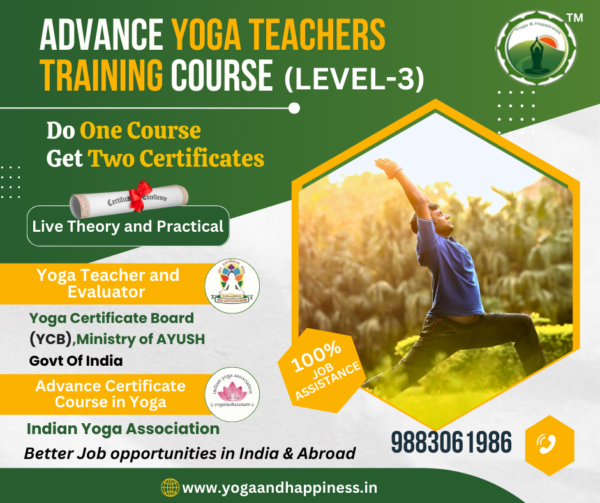
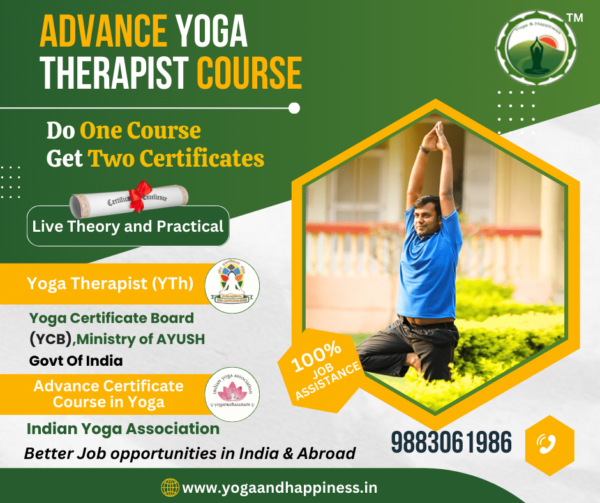
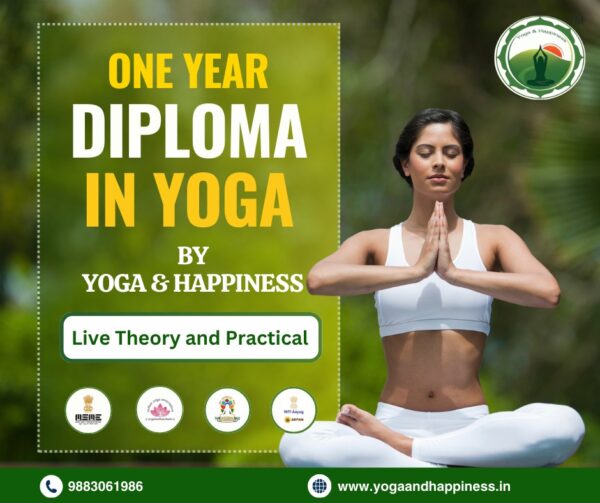
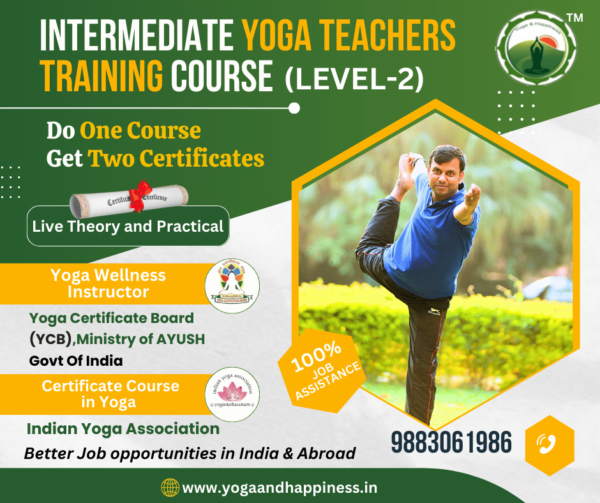


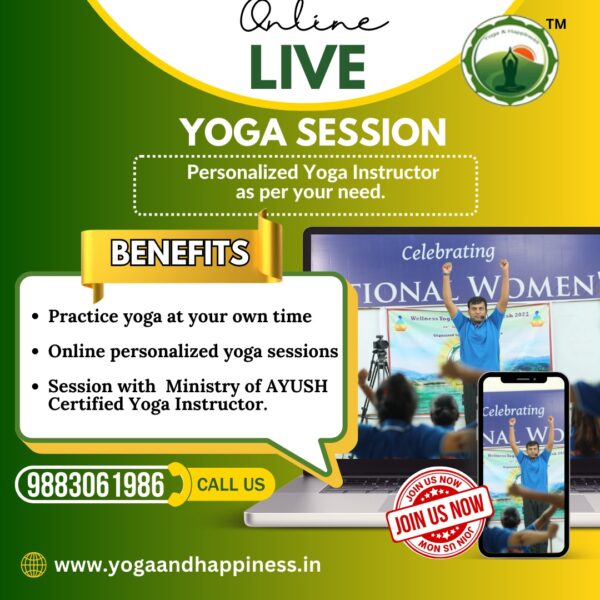

Reviews
There are no reviews yet.